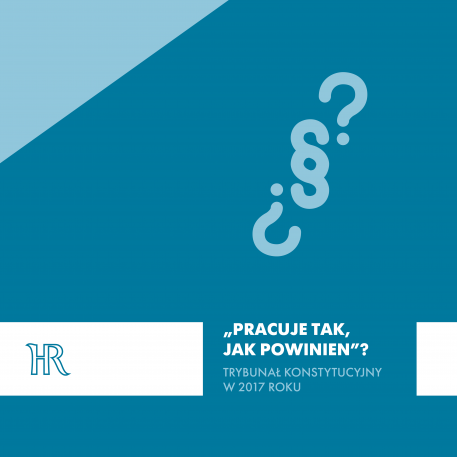
Does it work as it should? – HFHR’s report on activities of Constitutional Tribunal in 2017
A drop in confidence in the Constitutional Tribunal, a substantial decrease of the number of the cases that are heard and accepted, unreasonable restrictions on the public character of proceedings conducted before the Tribunal as well as additional concerns regarding the appointment of Julia Przyłębska as the President of the Constitutional Tribunal – these are the key conclusions of the HFHR’s report on the last year’s activities of the Constitutional Tribunal.
Conclusions
The report comprehensively describes the operations of the Constitutional Tribunal in 2017. It refers to the Tribunal’s jurisprudence and the reshuffles of Tribunal judges and administrative personnel. The report also explains the problem of limitations placed on the independence of Tribunal judges and measures used to influence the exercise the freedom of expression by retired judges of the Constitutional Tribunal.
The report presents disturbing conclusions. The year 2017 marked a record low number of cases heard by the Constitutional Tribunal. This coincided with the increasingly weaker inflow of cases referred for the Tribunal’s assessment. “It may be a proof that citizens and other authorised entities have limited confidence in using the Tribunal’s protection”, says Marcin Wolny, author of the report. “It will be extremely difficult, if at all possible, to regain this confidence”, he adds.
Proceedings before Constitutional Tribunal: open to public?
The report also discusses how open proceedings before the Tribunal are. Organisational changes brought about substantial limitations, in particular in respect of the media access to the Tribunal’s works. However, according to findings made by the HFHR, this issue has not been in any way regulated in Tribunal President’s order. Moreover, the laws governing the structure of the Constitutional Tribunal contain no basis for limiting media access to hearings. “Such a situation directly violates the freedom of speech and the citizens’ right to access to information about the activities of government authorities”, Mr Wolny points out.
Who sits on Tribunal’s bench?
The report also discusses the source of authority of the incumbent President and certain Tribunal judges to perform their judicial functions. The document further presents new circumstances that cast doubt as the whether, on 20 December 2016, Julia Przyłębska had the authority to convene the General Assembly of Judges of the Constitutional Tribunal in order to elect the new President. According to the information obtained by the HFHR, the Prime Minister countersigned the decision of the President of Poland to appoint Ms Przyłębska as acting president of the Constitutional Tribunal on 20 December 2017 at 9:32 am. Meanwhile, as an appendix to the minutes of the General Assembly of Judges shows, judge Piotr Pszczółkowski was notified of the convened assembly already at approximately 9:30 am.
The latest report Does it work as it should? (only in Polsih) can be read here.
A report on the constitutional crisis prepared by the HFHR in 2016 discussed the changes to the functioning of the Constitutional Tribunal introduced from June 2015 to August 2016. The publication in English may be accessed here.


29.03.2018
 Cookies EN
Cookies EN